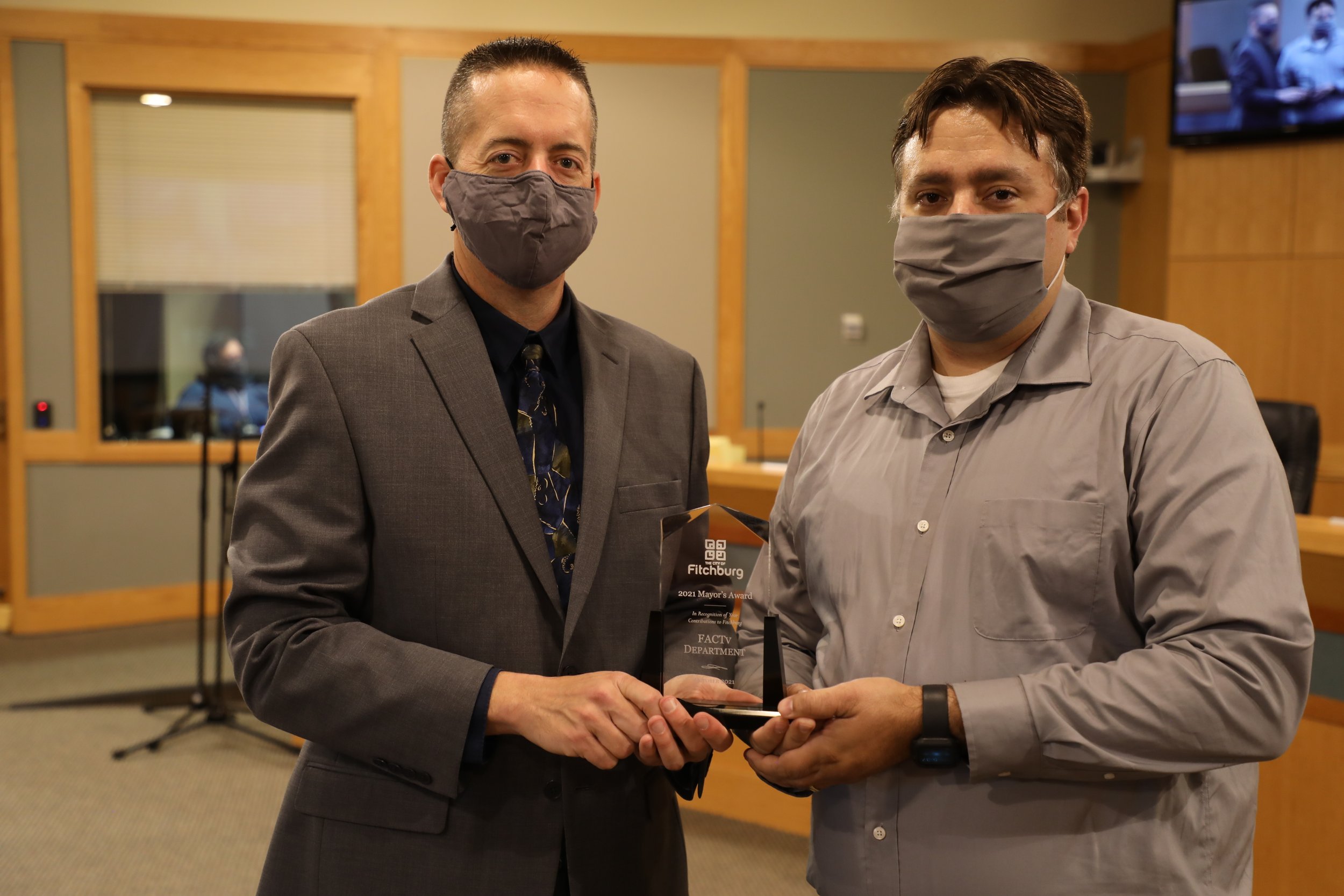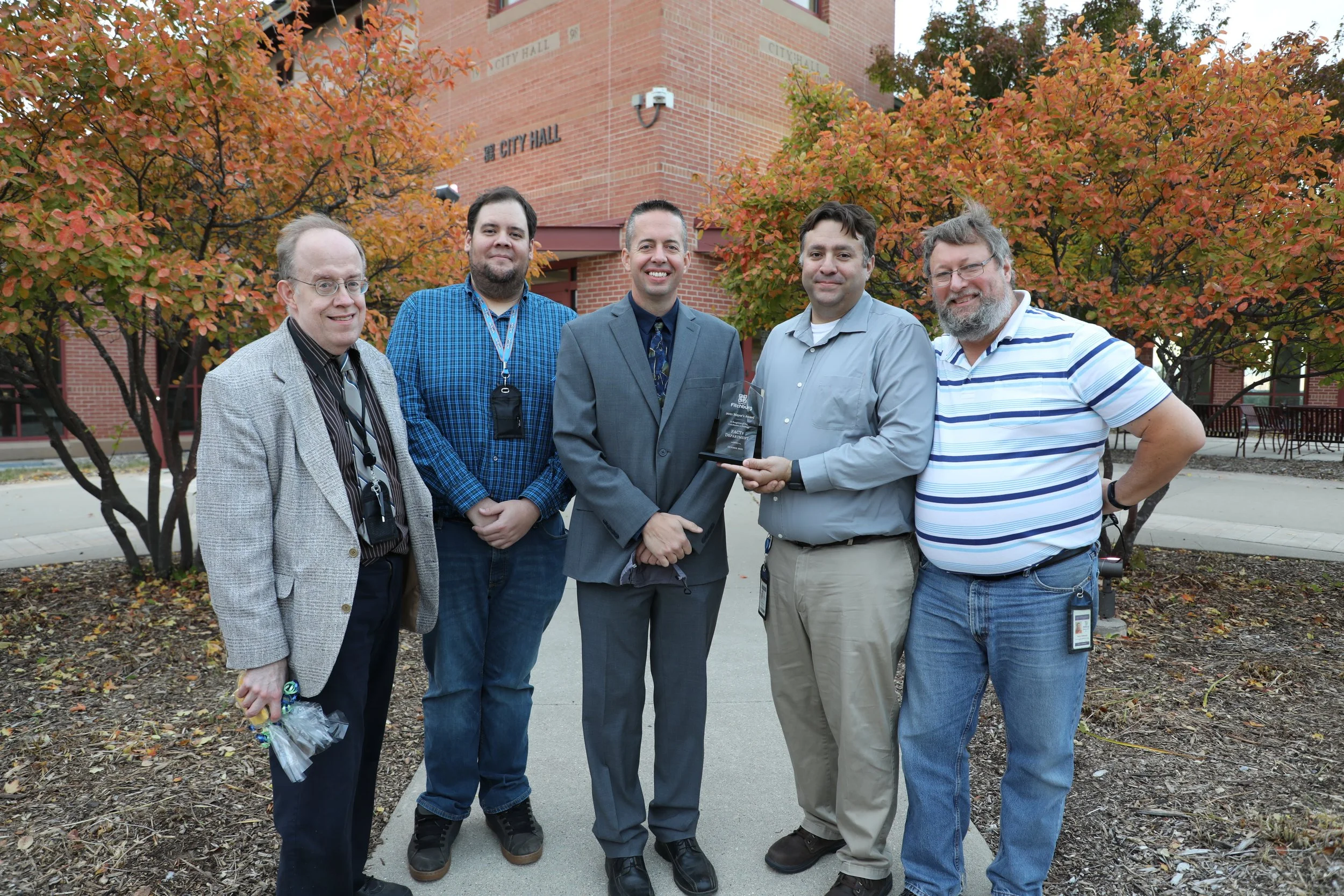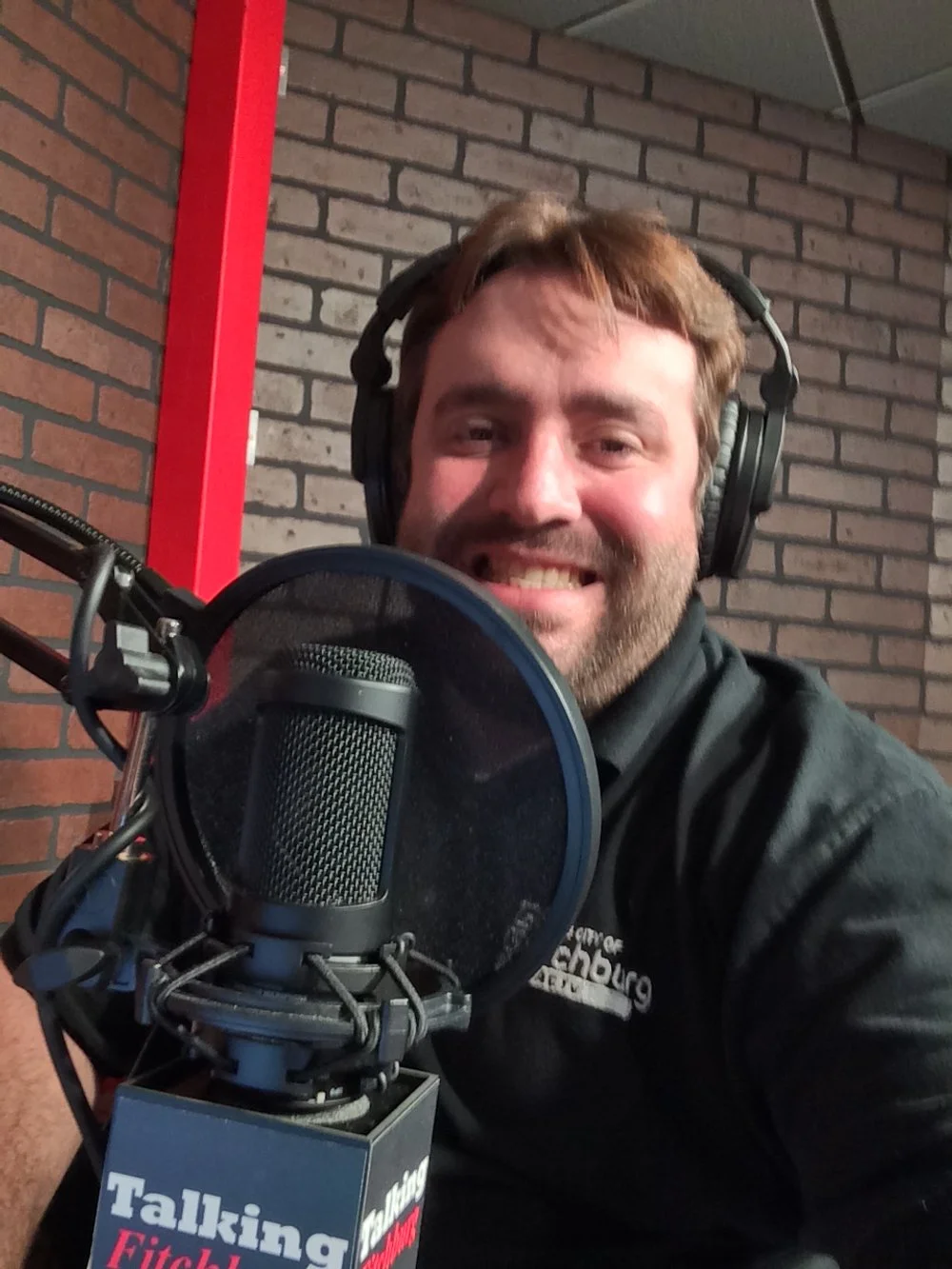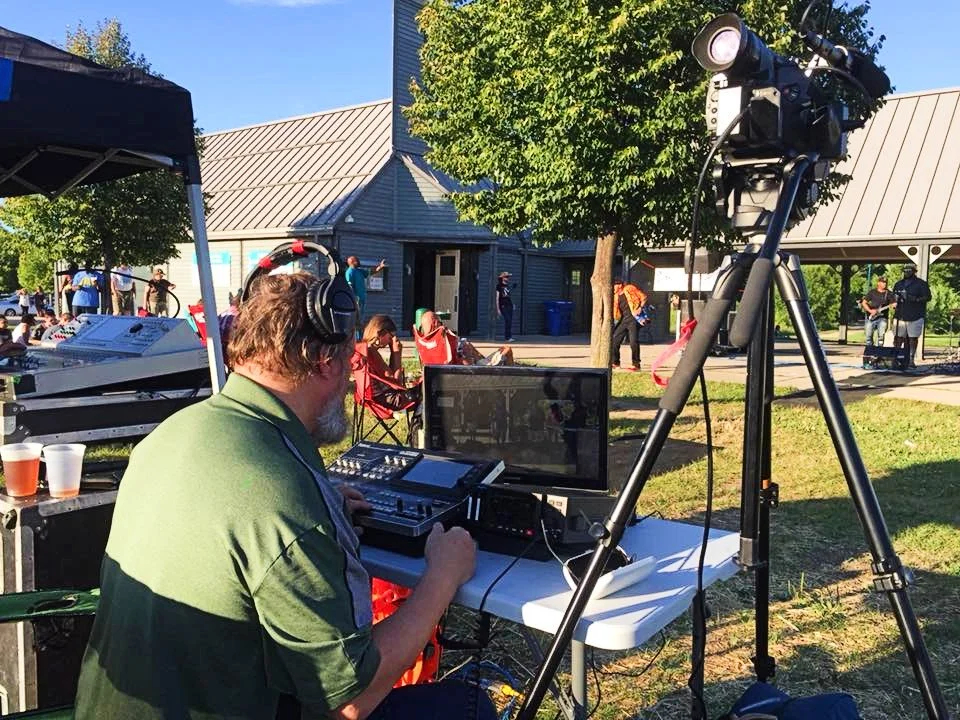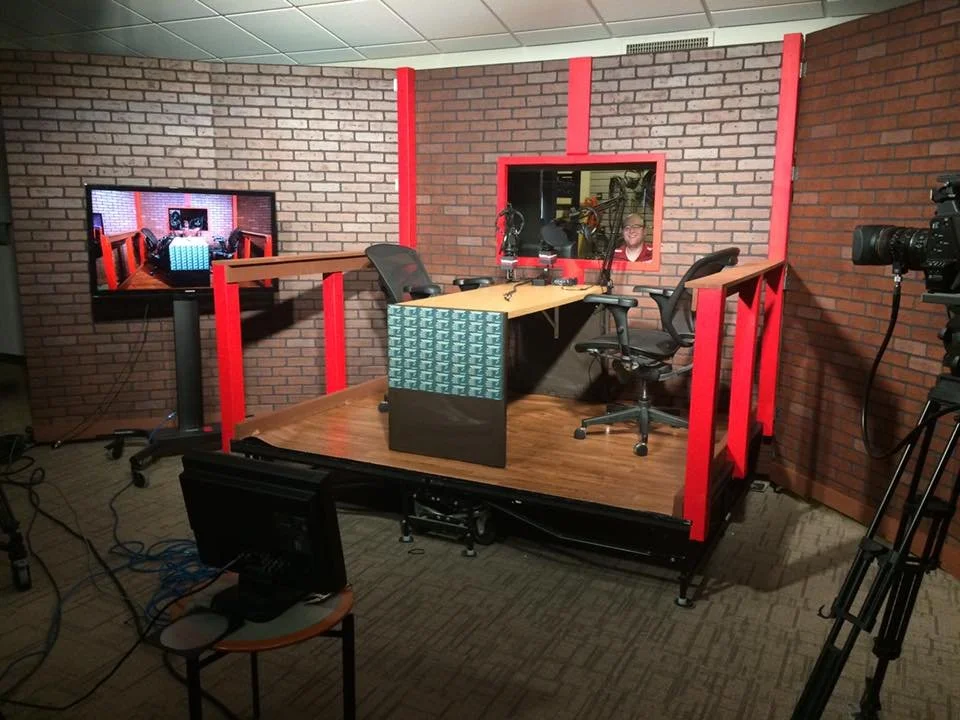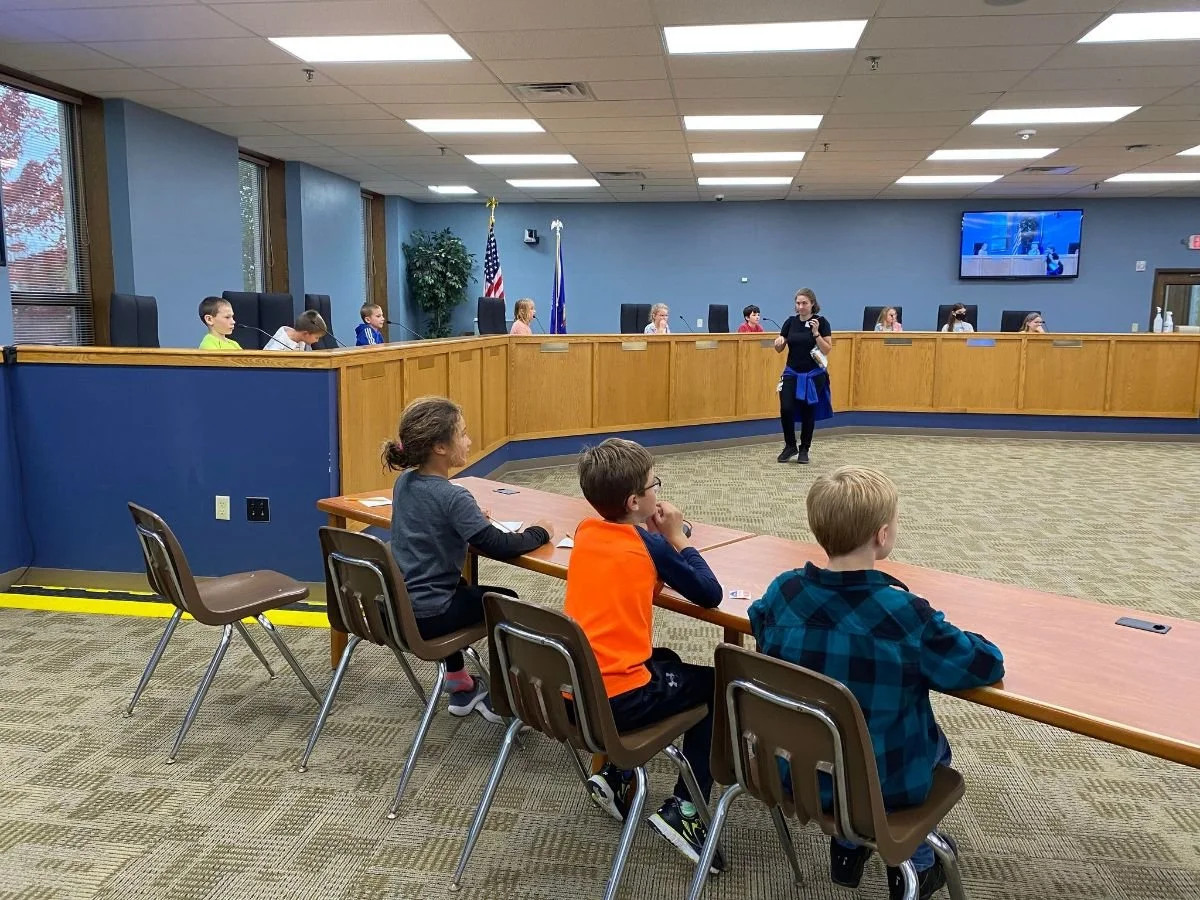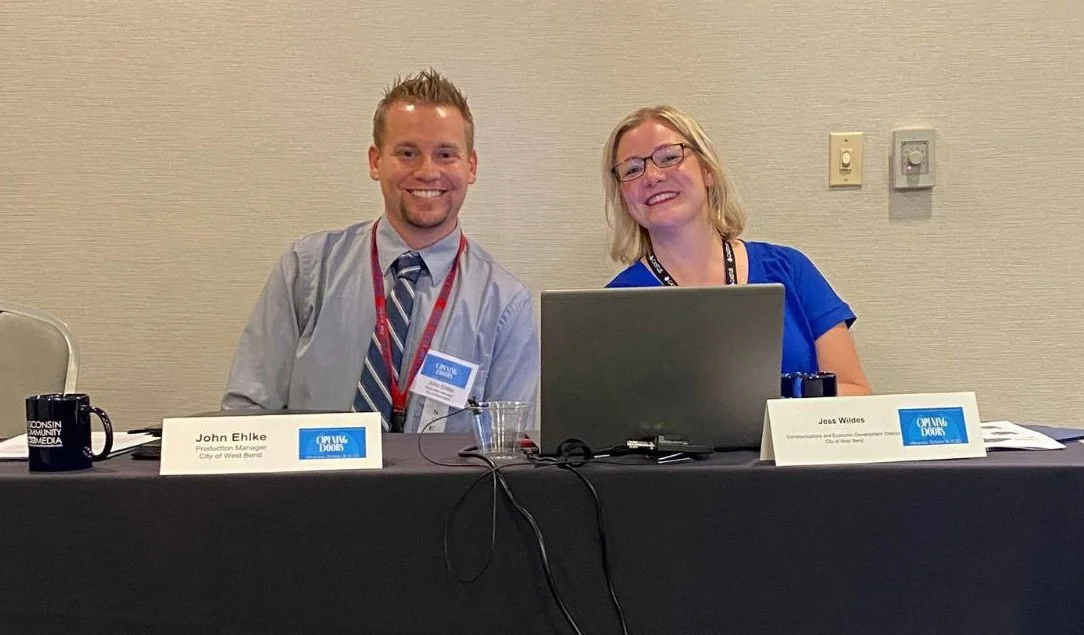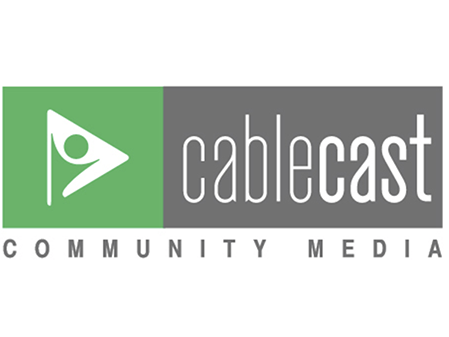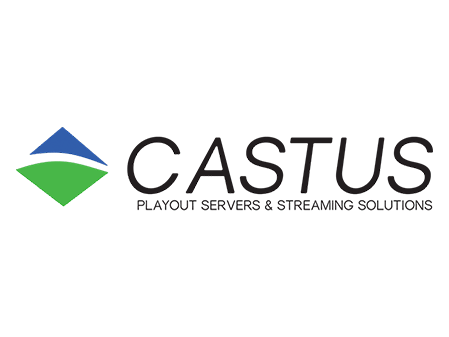Jeremy Crosby on the Talking Fitchburg set.
When Fitchburg’s PEG (public, education, government) cable access station got off the ground in 1985, a key part of its mission was to “build a stronger, closer community.” While for community media centers this mission is always central to their work, for the City of Fitchburg it has proved to be a special challenge.
For most of its existence, Fitchburg was a town; it only became a city 37 years ago in 1983, two years before FACTv was founded. Much of Fitchburg is farmland. Its population of 30,000 is spread out over 35 square miles in an almost perfect square just to the south of the City of Madison. Compare it to nearby Verona, whose population of 13,000 occupies only 7.5 square miles. Fitchburg has never had a main downtown and it is served by three school districts. “Bringing people together – the city, the school districts and the business community” -- is what I see as our main job,” said Jeremy Crosby, Community Media Services Manager for the City of Fitchburg.
On October 31, the City of Fitchburg will be annexing a portion of the Town of Madison. Crosby was appointed to a city communications team tasked with developing a plan to publicize the annexation and to explain to current and future residents what it would mean for them. “I have always seen my job as bringing people together, and with this project, I spent a lot of time meeting with people at parks, apartment buildings, and events. We developed flyers and PSAs in both English and Spanish. I learned a ton. It made me appreciate the value of personal outreach; it can be just as effective as social media.”
Getting out into the community was a welcome change for Crosby with community events just starting to come back after being at a standstill during the pandemic. But the pandemic did hold a silver lining. “You could say the pandemic ‘sealed the deal’ for why we are here,” said Crosby. “During the pandemic, when the community basically shut down, our focus turned to the needs of city government. We became indispensable for meeting coverage and implemented a hybrid meeting system. We helped staff with videoconferencing and set up livestreaming. We became – and still are -- the go-to place for multimedia assistance. It all keeps us really busy, but that’s good!”
FACTv’s flagship program, Talking Fitchburg, continued to be produced throughout the pandemic. Since debuting several years ago, the show has grown beyond the confines of a timeslot to becoming the format for the Community Channel. Every weekday at 11 am and 6 pm a new live 5-minute headline segment premieres that is then repeated on the half-hour until the next new headline segment premieres. After headline news, viewers watching at 6 pm see a new segment or “package” that runs 10 to 15 minutes long and features an interview and frequently field coverage of recent or upcoming events, health segments, and city department updates. Seamlessly following the new segment is another “package” that premiered earlier. A variety of these short segments fill the 24-hour schedule. “Our goal is to get new information sprinkled into the schedule throughout the day and make it easy for viewers to catch features they might have missed,” said Crosby. “It works really well.”
Crosby got the idea for Talking Fitchburg after attending a community media conference and getting inspired by how PEG access centers were filling the need for local news. “Our staff decided to jump in,” said Crosby. “We try to be anywhere where there’s a news story.”
Until the pandemic hit, a Spanish language version of Talking Fitchburg was also produced with the help of a volunteer team. “The FACTv staff would first use Google Translate on the English version of Talking Fitchburg, then we’d rewrite it, and finally we would show it to one of our two volunteers, one a local radio host and the other a city council member who are native Spanish speakers for a final review.”
Feeding the daily “news hole” is a challenge FACTv has solved by engaging the assistance of some key players. The city clerk helps FACTv learn what’s happening around town by automatically informing the center when a permit is pulled to hold an event. City departments inform FACTv about newsworthy projects and events. And the media center also gets help from the Chamber of Commerce that invites FACTv to groundbreaking events and business openings. Until the pandemic put the show on hiatus, FACTv also produced a show called Inside Business. Each half-hour program would feature two local businesses. “We are very proud of the close relationship we have developed with the Chamber of Commerce and our local businesses.”
FACTv also works with the Verona School District to shine the spotlight on high school athletics by producing a game of the week that rotates through “as many sports as we can,” said Crosby. The arrangement began about a year before the pandemic and then paused until recently. The other two school districts handle their own coverage.
FACTv is a “PEG” center, meaning it serves the public, educational institutions, and local government. Video production equipment can be checked out by community members and the staff offers training sessions to groups from time to time. “We have the most success when we go to the people we want to teach,” said Crosby. For example, prior to the pandemic, staff offered students video production classes at the Verona Area School District elementary and middle schools and at Eagle School, a private elementary school.
FACTv programming is distributed in a lot of different ways to reach different audiences. The city is served by three video service providers, all carrying the two FACTv channels in SD. Charter Spectrum puts the Community channel on 985 and the Gov Channel on 986. TDS TV carries the Community channel on channel 7 and the Gov Channel on channel 8. AT&T U-Verse channel 99 is the portal for seeing community channels on that system. FACTv channels can also be seen on Apple TV, Roku, and Amazon Fire TV. Crosby noted that it has been online for a long time. “We have been livestreaming our channels since 2010 on a high-quality streaming platform on the city’s website and we also offer programs on demand there. At some point, we anticipate cutting back to livestreaming our Government meetings Channel only and offering the programs we schedule on the Community Channel as on-demand only online.”
Crosby has been involved in PEG access television since he was a high school student in Middleton. He decided to check out an after-school video club, which produced programs for the city’s education/government access channel. The Audio-Visual Coordinator, Bonnny Lundy (WCM 2017 inductee into the Hall of Fame), who several years later would become the FACTv manager, sized him up and said, “You look like you could film sports!” And the rest is history. After he graduated, Lundy hired Crosby part-time while he worked on an Associate Degree in Visual Communications at Madison College. He also began freelancing and landed another part-time job with the local CBS affiliate, WISC-TV3. For five years he worked his way up to a full-time position as the morning show videographer. By 2008, he was thinking about getting married. Getting up at 3 am for his shift was getting harder and harder and the salary was still low. Managers at WISC-TV understood and gave him a parting gift. On the last segment of the last show he worked on, Jeremy proposed to his fiancé live on camera. “It was a good way to close out my career in TV and head out on my next chapter,” said Crosby.
After that he did some teaching at Madison College, worked at a pet crematorium (!) and kept building his own business. Then Lundy called. She wondered if he’d be interested in a part-time position at FACTv, where she was now working. He said yes and began his tenure at the station working briefly for the first director of the station, Connie Darling (2014 Inductee into the WCM Hall of Fame) and then Lundy, when she took over the position that year. In 2013, Lundy retired, and Crosby became manager.
Being at the helm of a successful media center is a big responsibility. Until recently, Crosby has been concerned about its future. City of Fitchburg residents seemed to “cut the cord” faster than many other cities and consequently, Video Service Provider (VSP) fees, on which the media center has always depended, were also dropping. The media center has always received all of the VSP fees, which has enabled it to employ a staff of five and upgrade and modernize equipment as needed. Now all that was looking in jeopardy. Cuts needed to be made and some solution for the future needed to be found. This year the city will be adding the media center to the general fund, disconnecting its budget from VSP fee revenue. Crosby said, “This is a huge relief. The city has invested all of this money and we now have it down to a science. But we know we still need to prove our worth every day.”
Crosby made certain to praise everyone who has “worked hard to make this place great” through the years. “I think what we have here is special. It's always been a group effort – a team effort. Every big decision involves everyone. We don’t do anything until everyone buys into the decision. We support each other. We won’t hesitate to go to bat for each other.”
Mayor Aaron Richardson presents FACTv Community Media Services Manager Jeremy Crosby with the 2021 Mayor’s Award
In October, 2021, FACTv was honored with a Mayoral Award for its efforts during the pandemic. Mayoral Award recipients are recognized for their “community leadership, inspiring service to the community, setting an example for others, and their commitment to and significant impact on Fitchburg.” Mayor Richardson said, “The FACTv staff are second to none and are dedicated to bringing the city together through the many different media platforms that they offer. Their coverage of city meetings and events is critical for providing information to residents and was especially important throughout the pandemic. Their work providing access using Zoom has been essential and has enabled the city to continue to allow residents to participate in city government.”
The Mayoral “Staff Award” was just icing on the cake. “This is a great place to work,” said Crosby.




